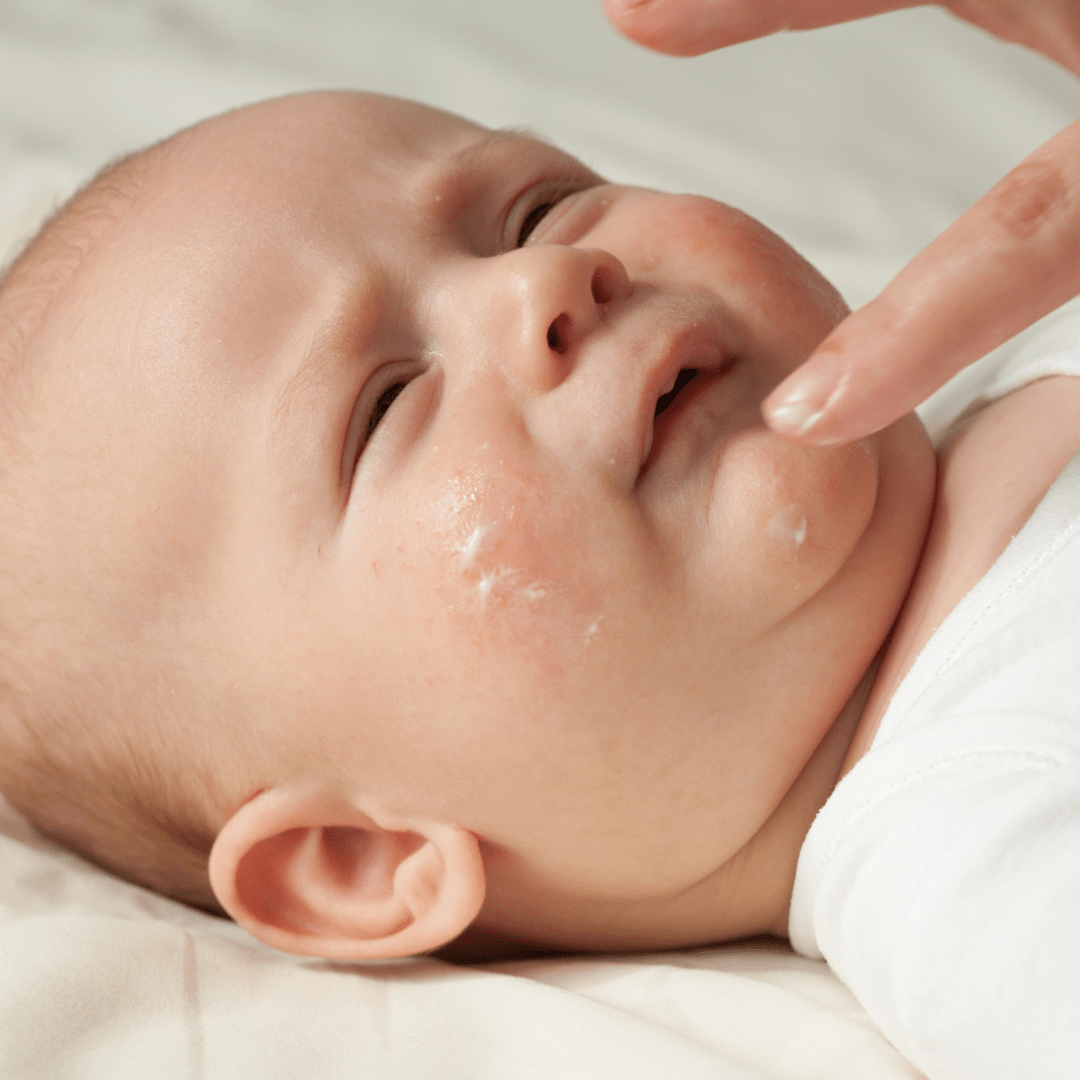Your Cart is Empty
Gift Sets
Categories

Newborn Eczema: How to Spot It Early and Help Your Baby Feel Better
by Adrian Ma July 01, 2025 5 min read
Bringing home a newborn is a beautiful and emotional time. You’re soaking up every snuggle, every coo, and every sleepy smile. But when your baby’s soft skin starts to turn red, dry, or itchy, it can be both confusing and distressing. One of the most common skin conditions in infants is newborn eczema, and if your baby is dealing with it you are not alone.
This guide will help you recognize the signs of baby eczema early, understand what causes it, and discover gentle, natural ways to soothe your baby’s skin, so they (and you) can feel a little more at ease.
What Is Newborn Eczema
Newborn eczema, sometimes called infant eczema or atopic dermatitis, affects the skin's ability to retain moisture. This results in dry, inflamed patches that can feel rough or itchy to the touch. It often appears in the first few months of life and is more common than many parents realize. Babies with eczema may have small flare-ups or more noticeable irritation depending on their environment, family history, and overall skin sensitivity.

Where Eczema Shows Up on a Baby’s Body
Although every baby is different, eczema tends to show up in common areas such as: The cheeks, forehead, scalp, chest, stomach, back, arms, and legs, especially in the folds.
In milder cases, you may notice small dry patches. In more irritated skin, it can become red, oozy, or even crusty, and if left untreated, these areas can thicken over time due to continued scratching or friction.
Signs to Look For
It can be hard to identify what is bothering your baby, but their skin often gives you early clues. Here are the most common signs of baby eczema to watch for:
-
Dry or flaky skin, especially on the face or limbs
-
Redness or patches that seem irritated
-
Itchy skin that causes your baby to rub their face or body
-
Tiny bumps or blister-like spots that may ooze clear fluid
-
Crusty or rough patches that return even after moisturizing
Checking your baby’s skin during daily changes or bath time is a simple way to stay ahead of flare-ups.
Why Do Babies Get Eczema
Eczema in newborns usually develops from a mix of genetic and environmental factors. If you or your partner have a history of eczema, asthma, or allergies, your baby may be more likely to develop sensitive skin.
Some everyday triggers that can contribute to eczema flare-ups include:
-
Dry air or temperature changes
-
Overheating or sweating
-
Skincare products with fragrances or harsh ingredients
-
Rough or synthetic fabrics
-
Exposure to allergens like dust, pet dander, or certain foods as baby grows
Keeping track of these triggers can help you understand what might be making your baby’s skin worse and allow you to make small changes that have a big impact.
Gentle Ways to Soothe Baby Eczema
The good news is that baby eczema is very manageable. With a few gentle adjustments to your daily routine, you can help your little one stay more comfortable and minimize future flare-ups.
Moisturize Often and Generously
The single most important thing you can do is moisturize. Use a thick, unscented cream or ointment that is made for sensitive baby skin and apply it at least twice a day, especially after bath time. Products with calendula, like California Baby's Calendula Cream, offer added soothing benefits and work well on irritated or dry patches.
Keep Baths Short and Skin-Friendly
Bathing should soothe your baby, not dry them out. Use lukewarm water and keep baths under ten minutes. Avoid soaps with strong scents or foaming agents. A soap-free baby cleanser is the better choice for everyday use.
You can also add colloidal oatmeal to the bath to help relieve itching and hydrate the skin. This is especially helpful during flare-ups. Afterward, gently pat the skin dry and avoid excessive rubbing.
Choose Breathable, Natural Clothing
Your baby's clothing matters more than you might think. Natural fabrics likeorganic cotton and bamboo are soft and breathable, helping prevent overheating and irritation. Stay away from wool, fleece, or synthetic blends that can trap moisture and aggravate sensitive skin.
Smart Tips for Daily Eczema Care
Here are a few more simple but effective ways to manage eczema day to day:
1. Prevent Scratching During Sleep
Babies often scratch without realizing it, especially when asleep. Keep nails trimmed short and try baby rompers with fold-over mittens to prevent skin damage. Our organic bamboo rompers are especially helpful here, as they are soft, cozy, and designed to keep little hands covered without fuss.
2. Watch for Triggers
Start keeping a log of what your baby eats, wears, or comes into contact with on days when flare-ups occur. Triggers can include:
-
Drool from teething
-
Sweat or excess heat
-
Certain wipes or detergents
-
Household dust or pet fur
3. Adjust Your Environment
Use a humidifier during dry seasons to prevent skin from drying out. Keep the nursery cool, well-ventilated, and free of harsh air fresheners or strong fragrances.
4. Know When to See a Doctor
If eczema persists, becomes infected, or seems to be spreading, it’s best to consult your pediatrician. They may suggest a mild steroid cream or look into possible food allergies, especially if you are breastfeeding. Try to avoid steroid creams as much as possible in the early days, but if the eczema is not improving from other lifestyle changes, it is a potential remedy that you can discuss with your pediatrician.

You Are Not Alone in This
Eczema can be emotionally draining, especially when your baby is uncomfortable. But remember, most babies outgrow it by toddlerhood. With your care, love, and a few simple strategies, your baby can start to feel more at ease.
If there’s one thing we’ve learned as parents, it’s that you’re never alone in this journey. And that a parent’s intuition is stronger than you realize.
Final Thoughts
Newborn eczema is manageable with the right care. It starts with recognizing the early signs, keeping your baby’s skin moisturized, and avoiding known irritants. As your baby grows, their skin will strengthen, and flare-ups will likely become less frequent.
Until then, simple choices like using eczema-safe baby skincare, dressing in soft organic fabrics, and avoiding environmental triggers can go a long way.
Let your baby’s skin be a window into how they are feeling, and know that with a little extra care, they’ll feel more comfortable in no time.
FAQ: Newborn Eczema
What is the difference between baby eczema and cradle cap?
Eczema is dry, red, and itchy, while cradle cap looks more like oily, yellowish flakes on the scalp. Eczema often appears on the cheeks, arms, or legs and causes discomfort, while cradle cap usually does not.
Can breastfeeding affect baby eczema?
In some cases, a baby may react to something in the breastfeeding parent’s diet. If eczema seems to worsen after feedings, speak with your pediatrician about possible food sensitivities.
How long does baby eczema last?
Many babies outgrow eczema by age two or three. Others may continue to have mild symptoms throughout childhood, especially if they have allergies or asthma.
Should I stop using wipes if my baby has eczema?
If you are using scented or alcohol-based wipes, switch to gentle baby wipes for sensitive skin or use a warm, damp cloth instead.
Is it safe to use steroid cream on my baby?
For moderate or severe eczema, your doctor may prescribe a mild corticosteroid cream. Use it exactly as directed and only under medical supervision.
Leave a comment
Comments will be approved before showing up.
Also in Latest Blog Posts

Navigating Holiday Travel with a Baby: Your Complete Guide to a Stress-Free, Joy-Filled Journey
by Adrian Ma December 09, 2025 6 min read
Holiday travel with a baby can feel like stepping into a live reality show, one part adventure, one part uncertainty, and a whole lot of planning. Whether you’re hopping on a long-haul flight to see family or doing a quick getaway to recharge, traveling with little ones during peak holiday season doesn’t have to turn into chao
Recently viewed products
Sign up to get 15% OFF your first order
Sign up to get the latest on sales, new releases and more …





